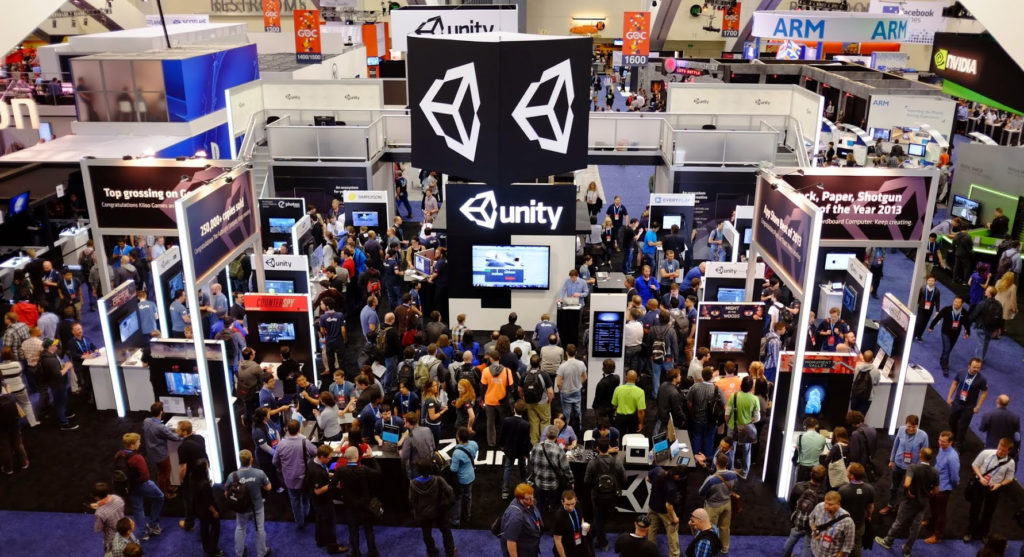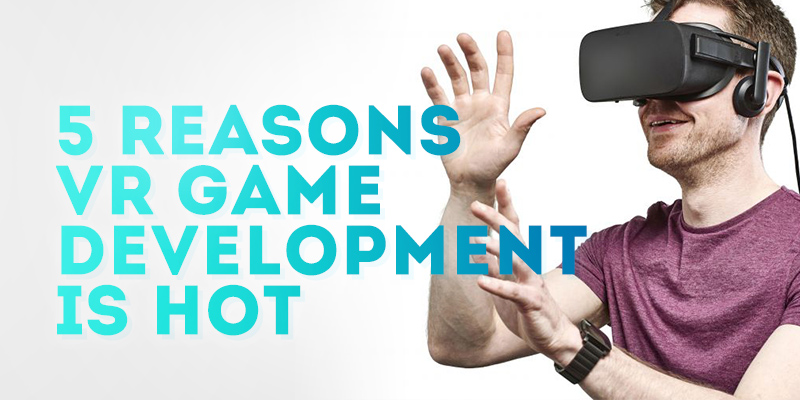A survey of more than 4,500 developers attending the recent Game Developers Conference confirmed what we have been telling you for months: virtual reality game development is getting ready to become big business. 39% of game developers surveyed indicated that they are developing for AR/VR devices and platforms, or plan to for their next game.
The survey reflects a new high for interest in VR game development. Advances in VR hardware and software, along with dropping price points, is making VR gaming technology both powerful and accessible. Virtual reality gaming companies, now confident in the sustainability of VR gaming, are taking VR game development seriously.
While the survey, taken at the 5th annual GDC, reflects the state of AR and VR gaming, the results indicate that VR will dominate the gaming market.

Game Developer Conference 2017
Source: Alphagamma.eu
And what a market. VR game revenue is projected to reach $45.09 billion by 2025. Also interesting is that the virtual reality gaming market is projected to have a compound annual growth rate (CAGR) of 128%, which would be impressive in any industry.
In this article, we will consider five reasons why VR game development not only makes sense, but dollars, as well.
VR Games Are Driving VR Adoption
As the survey suggests, a growing number of developers are abandoning outdated platforms in favor of VR. Thanks to increasing interest in virtual reality game development, VR gaming is now the highest adopter of VR content.
This is of greater importance to the developer than you might think. Since VR game development has become a driver of VR content development, we can expect to see even greater advances in the creative side of VR. As virtual reality gaming companies churn out more and more VR games, content investment dollars will shift from 2D and pseudo-3D content to near-photorealistic content. Advances in high-end content creation will open opportunities for VR game developers to produce games with higher-quality imagery.
Now that it is clear that VR is not going away, there is a growing list of companies involved in virtual reality content creation. Not only does this provide fodder for the VR game coder, but it also provides new opportunities for VR game developers who can develop highly-detailed graphics.
VR Gaming Platforms Offer a Premium Gaming Experience
Computer games have come a long way since Atari introduced the home version of pong in 1972. And while XBox and PC games continue to hold a loyal share of the market, the future of computer gaming belongs to the new breed of VR platforms.
Advances in both hardware and software is taking VR gameplay to increasingly higher levels. 2D and even 3D games pale in comparison to the immersive, interactive experiences offered by VR gaming platforms.
The availability of low, medium, and high-end devices allows developers to target gamers who play on a budget, those who don’t mind spending a bundle for the best VR gameplay experience, and everyone inbetween.
Platforms that are either VR exclusive, or that support VR games, can be divided into three categories, as shown below:
PC-Powered Headsets
- HTC Vive
- Oculus Rift
The most advanced VR platform is the HTC Vive. With superior room-scale tracking response and a full array of advanced sensors, the HTC Vive is the platform of choice by many developers wishing to provide the ultimate VR game experience.
Facebook’s Oculus Rift has a slightly smaller following, but don’t let that discourage you. It is a good bet that Facebook is, even now, exploring how to integrate multiplayer VR gaming into their social media platform. For developers who already have a foot in social media, the Oculus Rift could be the ideal place to develop gaming technology that even Facebook might want to buy.
Both HTC Vive and Oculus Rift require beefy PCs in order to do their magic. However, developers who would rather aim high rather than go mobile can find the field wide open for development on either platform.
Smartphone-Powered Headsets
- Samsung Gear VR
- Google Daydream
- Google Cardboard
The smartphone-powered platforms offer something for everybody. Developers who want to enter VR gaming on a small budget have the still-viable Google Cardboard. Not only is development cost for the Cardboard relatively low, but the low cost of Cardboard viewers enables you to reach the masses with your VR game.
The Google Daydream has not yet gotten the attention Google had hoped for, but it is early, yet. The Daydream represents an opportunity for developers to create VR games from simple to moderate complexity. According to the survey, about 17% of developers expressed an interest in Daydream, which, in a $4 billion market is not insignificant.
Samsung Gear VR is a solid platform with a significant market. Samsung is, in fact, the leading device in the mobile VR space. Developers looking for an established market often find Gear VR the ideal place to innovate.
Consoles
The Sony Playstation has always had its fanbase, and it always will. While the console-based platform means gamers will need to stay close to home, the tech specs enable developers to deliver a premium quality VR experience for a captive audience.
VR Games Offer Excellent ROI
Whether your development budget is $10K or $10M, virtual reality game development can lead to tremendous returns on your investment capital. Consider Grand Theft Auto V. The game has sold more than 75 million copies and grossed more than $4.2 billion — that figure is higher than the gross domestic product of some countries.
Although not every VR game will earn 7 figures, this example proves that gamers are willing to throw money your way, if your VR game captures their attention.
Even simple VR games that cost $5K to $10K to develop can provide multiplied returns over the course of a couple of years.
Gaming is Increasingly Mobile
Though PC and console gaming markets remain strong, gaming development companies are increasingly turning to mobile gaming as their target platform. One such example is Chinese tech company, Alibaba. In an alliance with other mobile gaming companies, Alibaba is investing 1 billion yuan (over $145 million USD) in mobile game distribution.
The fact that Alibaba expects to capitalize on growth in the Chinese mobile gaming market is, indeed, telling. No one knows the Chinese market better than Alibaba. If they expect growth in the stiff mobile gaming market of China, we should expect growth everywhere.
What does his have to do with VR gaming? A lot. The popularity of the Samsung Galaxy phones and tablets, alone, creates a tenable market for VR developers. Mobile game revenues surpassed PC and console gaming earnings in 2016, and we expect the trend to continue through 2017.
All things considered, mobile game development of any type is a pretty safe bet, and mobile VR gaming holds even more promise.
Development is Becoming Affordable
A fifth reason developers should consider VR game development cost. Thanks to powerful game development platforms such as Unity3D, and extensive software development kits (SDKs) provided by device manufacturers, developers can create VR games that are not only powerful, but cost-effective to develop.
While creating a cool user story and unique characters is still a challenge, the question of how to create a VR game is getting easier by the day.
Whether you develop your own VR game or hire a developer, the tremendous resources available, today, can keep development cost within budget.
The Bottom Line
As with any technology-driven market, success in VR gaming will come down to three questions:
- How well do you know the technology that drives the market?
- How well do you know the market?
- How well can you leverage the technology to meet market demand?
In the highly-competitive world of VR game development, you cannot afford to play around. You need the right technology developed for the right platform for your VR game. That takes careful planning, and a technology partner who knows VR gaming technology and the VR game market. Whether you outsource your VR game development or build your game yourself, we hope this article has helped you target the right device and platform for your next VR game project.


 (6 votes, average: 3.83 out of 5)
(6 votes, average: 3.83 out of 5)
Cool!